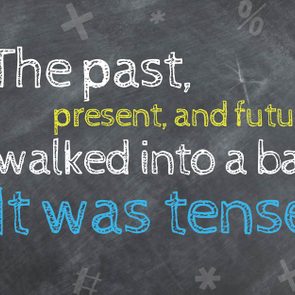Not sure when to use envy vs. jealousy? While it's not fun to feel either of these, the word choice clues are in the context.

“Envy” vs. “Jealousy”: What’s the Difference?

The English language is rich with synonyms. But not all synonyms are created equal. Take envy vs. jealousy for instance. You can sometimes substitute one for the other, but the usage really depends on your intended meaning. Confused? You’re not alone.
If you pick jealousy vs. envy in a sentence, or vice versa, it may or may not be the best word choice. Since their definitions have something of an overlap, sorting between the two can be extra confusing.
If you’re a grammar enthusiast who appreciates the difference between commonly misused words and other grammar rules to sound smarter, understanding when to use envy or jealousy will be right up your alley. Read on to learn what each word means and how to use them properly.
Get Reader’s Digest’s Read Up newsletter for more grammar, humor, travel, tech and fun facts all week long.
On This Page
What does envy mean?
If you covet what someone else has, that’s envy. It can be a tangible thing, like jewelry, or intangible, like a characteristic or a relationship. Envy can be a noun or a verb. You envy someone’s new car, but the feeling you have when seeing it in their driveway is also envy.
The origin of envy
Envy stems from the Latin invidere, which means to “look upon” or “see,” sometimes with negative emotion. In that context, begrudge can be a handy synonym. While you may be happy for someone else’s good fortune, you would also prefer a little bit of it for yourself.
Examples of envy in a sentence
- I envy my daughter’s ability to sleep during long car trips.
- The bridesmaid disguised her envy of her best friend’s wedding gown with a broad smile.
- He wanted to feel happy about his colleague’s promotion, but all he felt was envy.
What does jealousy mean?

Jealousy describes the feeling of resentment, bitterness or hostility toward someone who has something you do not. Imagine envy on steroids.
The word is also commonly used in relationships when someone suspects his or her partner is unfaithful or when someone suspects a rival is poaching a partner. Whether founded or unfounded, jealousy is considered unhealthy for people, relationships or both. And if you’re feeling jealous, you’re often feeling threatened by a third party or fearful of losing something that’s yours.
The origin of jealousy
The root of jealousy derives from the Greek word for zeal. While zeal suggests great energy or ardor, jealousy is altered to an all-negative association, whether it is coveting someone else’s fortunes or guarding a relationship against intruders. William Shakespeare refers to jealousy in The Merchant of Venice and later in Othello as the “green-eyed monster,” i.e. emotion that could push you over the edge.
Examples of jealousy in a sentence
- A day at the country club turned sour for the young man, as he could only feel jealousy when his girlfriend stopped to chat with the lifeguard.
- The tech company CEO dismissed the negative chatter about him as jealousy.
- The jealous political candidate refused to shake hands when her rival won, blaming her loss on a biased press.
What’s the difference between envy and jealousy?
For starters, jealousy is a noun, while envy can be a noun or a verb. But the differences go beyond the grammar basics.
Intensity is more important. When the emotion is deeply felt and spiteful, jealousy is likely the culprit. That’s especially true in romance. Sure, someone can be envious of a marriage between two loving people, but that’s over the relationship, not the people themselves. Bitterness and resentment, or a behavior-altering fear of losing one’s partner, are the products of jealousy, not envy.
Can envy and jealousy be used interchangeably?
No. While it’s fine to use jealousy in place of envy, using envy instead of jealousy in a sentence would alter the meaning of the sentence, making it incorrect.
If you thought envy and jealousy were synonyms, maybe blame the phrase “green with envy” and its long history. It likely predates Shakespeare’s connection to the phrase. Debated origins of “green with envy” include the biblical story of Cain, who murders his brother Abel in a jealous rage, and ancient Greek lore that linked green to the color of bile and its impact on a jealous lover’s face. So forgive yourself if envy vs. jealousy felt interchangeable to date.
Why should you care about envy vs. jealousy?
Knowing how to differentiate between envy and jealousy can make you a better writer and help you feel more confident in your word choices. It may seem like a small thing, but knowing which word to use shows a real skill with language that can make a difference in both conversation and writing.
Why trust us
At Reader’s Digest, we’re committed to producing high-quality content by writers with expertise and experience in their field in consultation with relevant, qualified experts. We rely on reputable primary sources, including government and professional organizations and academic institutions as well as our writers’ personal experiences where appropriate. We verify all facts and data, back them with credible sourcing and revisit them over time to ensure they remain accurate and up to date. Read more about our team, our contributors and our editorial policies.
Sources:
- Merriam-Webster: “Jealousy”
- Merriam-Webster: “Envy”
- Language Humanities: “What does it mean to be ‘green with envy’?”






















